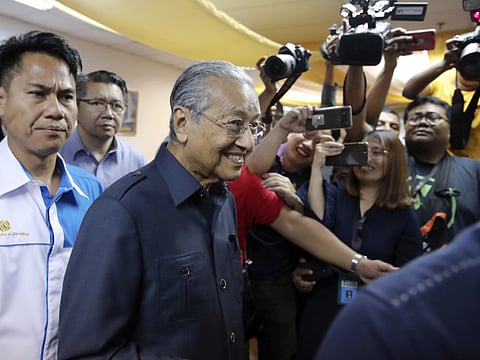Mahathir Mohammad is back, Malaysians may not be smiling for long
The last time he was prime minister, there were crackdowns on the press, judiciary and opposition. And yet his re-election is being lauded

The astonishing victory of Mahathir Mohammad in Malaysia’s elections has been hailed as a coup for democracy. It is certainly an extraordinary comeback. Mahathir, 92, was previously prime minister between 1981 and 2003. Returning as the head of an opposition coalition, he defeated his former protege Najeeb Razak last week and ended six decades of one-party rule in the country. Sworn in as the world’s oldest prime minister, Mahathir has called for an inquiry into the multibillion-dollar corruption scandal that had engulfed the previous government.
The downfall of Razak is as welcome as it is spectacular. Under Razak — whose father Abdul Razak Hussain was Malaysia’s second prime minister — Malaysian officials are alleged to have looted more than $4.5 billion (Dh16.55 billion) in public funds. Last year, the United States attorney general Jeff Sessions described this as “kleptocracy at its worst”. There was little indication that the perpetrators of this crime would be brought to justice under Razak’s rule. The new premier has also said that he will seek the release and pardon of Anwar Ebrahim, Malaysia’s jailed opposition leader.
So the optimistic version of the story runs like this: Mahathir’s victory is a win for people power over corruption. His return will see justice done and corrupt public officials will get their comeuppance. Then he will be succeeded by Anwar, fulfilling a promise he made on the campaign trail. Anwar is a highly capable and reforming politician who will unleash Malaysia’s full economic potential.
But hold the optimism for a moment. What is the likelihood of these high hopes being fulfilled? The most honest answer is that the probability is slim. We know that Mahathir is no friend of liberal democracy. Under his previous tenure, his government launched vigorous attacks on the judiciary, arrested and detained peaceful opponents under internal security laws, and tightly controlled the press. He is a defender of Malaysia’s retrograde affirmative action programme, which privileges Malays over the country’s other races. These racial privileges include discounts on housing, a university quota system that was officially abolished in 2002 but is widely believed to persist in practice, as well as preferential access to government jobs and public sector contracts. The programme has spurred the departure of many ethnic Chinese people. A “brain drain” of highly skilled migrants accounts for about a third of Malaysia’s 1 million-strong diaspora, according to the World Bank.
An important factor in Mahathir’s election victory was the populist pledges to scrap Malaysia’s new goods and services tax (GST) — an unpopular tax on consumption — and to bring back fuel subsidies. Both these pledges were popular with voters for obvious reasons: The GST was blamed for a rise in the cost of living, and the loss of fuel subsidies also hit them directly in the pocket. But they were important reforms aimed at strengthening Malaysia’s public finances, cutting its fiscal deficit and broadening the tax base.
Mahathir has won power by promising to undo these reforms. What are the chances that the coalition he has led to power will have the stomach for the bigger changes Malaysia needs? For Malaysia is in a tricky position. Elsewhere in the region, countries have got ahead through economic specialisation. Singapore has finance; Thailand has a thriving automotive industry; Bangladesh makes garments. Malaysia is dependent on oil, which will eventually run out. It has tried and failed to launch a car industry. The Proton, Malaysia’s “national car”, was created under Mahathir during his first term, fuelled by government money and shielded by import tariffs. Its sales have declined sharply since the 1990s, partly because import tariffs were stripped away.
For signs of where Malaysia goes next, Mahathir’s son Mukhriz is worth watching. He was sworn in as chief minister of the Malaysian state of Kedah. Mukhriz was ousted from the post by prime minister Razak in 2016, after he criticised the premier over corruption.
A pessimistic version of Malaysia’s future runs as follows: The country may have swapped one political dynasty for another; a degree of justice may be done, but Malaysia’s institutions will remain weak; there is no prospect of real and lasting change.
Mahathir was driven to the national palace, the official residence of the Malaysian king, to be sworn in last week. The car he arrived in? A Proton — symbol of Malaysia’s unfulfilled promise.
— Guardian News & Media Ltd
Jeevan Vasagar is a former Guardian education editor.


